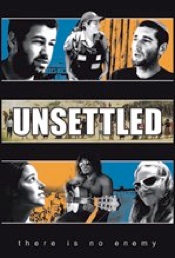Unsettled, a 2007 documentary, and winner of the Special Jury Price for a documentary feature, the Grand Jury Prize for best documentary, the Jury Prize for best documentary, and the Audience Award for best documentary, was written, directed, and produced by Adam Hootnick. The film depicts the personal experiences of six Israeli Jews who were uprooted from Gaza during Israel's disengagement from the territory in 2005– a move which came after much deliberation and debate. Ariel Sharon, Israel’s then prime minister, finally decided to test the theory that evacuating Jews from Gaza and handing over complete control of that land to the Palestinians would result in a Palestinian state and a lasting peace; the disengagement was to give the Palestinian Authority a chance to prove itself as capable of establishing a modern state with competent self-rule.
Unsettled opens by showing a nearly unrecognizable Gaza from that of today– a Gaza before the Disengagement, filled with greenery, children playing in the fields, construction for the future, synagogues, and working greenhouses.
The film introduces the audience to its main protagonists– the six Israelis on which the film focuses describe their love of the land, their desire for coexistence with their Palestinian neighbors, and the terror and hardships inflicted upon them for being Jewish in a predominantly Palestinian-Arab territory. One of the six– a mother who describes the day her husband was brutally stabbed to death by Palestinian neighbors while working in his greenhouse during the day, leaving her a single mother of six young children– is particularly heart-wrenching.
Throughout the film, Hootnick provides a much-needed platform for people like this woman to share their personal stories with the world. At a moment when much of our Western society is fed a narrative of evil, extremist Jewish settlers, Hootnick manages to earnestly present their stories, humanizing them and reminding the audience that media portrayals of Jews in Gaza may not be entirely accurate.
Fascinating, too, are the predictions each of the six express– the worry about what a disengagement from Gaza means for the future of the Jewish state. One man is convinced that “withdrawal from Gaza and northern Samaria is the beginning of the process that will lead to the destruction of Israel.” Filmed back in 2005 and 2006, his assertion takes on new significance today, as we look back on the Hamas takeover and almost 10 years of increased terror emanating from the Strip. As Israel attempts to balance international demands for peace and a Palestinian state, Arab pressure to make concessions, and concern for the safety and security of the Israeli populace, the film spurs its audience to think carefully about the implications of further Israeli territorial compromise.
One of the best features of the film is its coverage of the struggles of IDF soldiers during the disengagement. Hootnick's skill as a filmmaker is especially evident here; he shows individual Israeli soldiers as human beings, rather than as the heartless automatons they are often depicted as. Many of the IDF faced an almost impossible moral dilemma in following their orders to uproot their fellow Israelis from their homes and the towns in which they raised their families. Tears and pain overflow on both the side of the Israeli soldiers as well as the Jewish settlers; Unsettled expertly expresses the heartbreak as Jewish homes and communities were demolished in order to make way for the Palestinians to build.
Ultimately, Unsettled is perhaps more relevant now than it was when it was first released. It depicts the misery and division that arose from the disengagement of only 8,500 Israelis from Gaza; should Israel acquiesce to demands to evacuate Judea and Samaria of Jews (a population of several hundred thousand), what will the result be for Israel? Will a lasting peace result, or will the absence of Jews and Israeli security forces facilitate the creation of another territory that functions as a breeding ground for terrorism, as Gaza now does? Unsettled's success is that the heart-breaking stories it contains, despite being almost 10 years old, are truly timeless. With the examination of the incredible personal cost of Disengagement on each Israeli it touched, the film invites the audience to thoroughly examine the implications of any future policy involving such drastic Israeli sacrifice in exchange for peace that does not come.
By Elisa Greenberg


